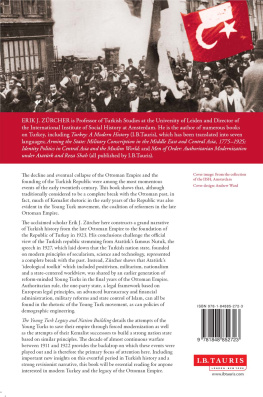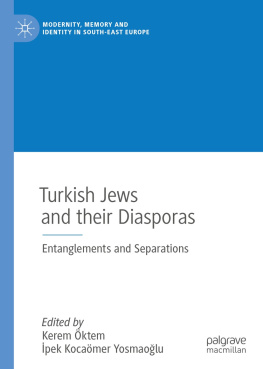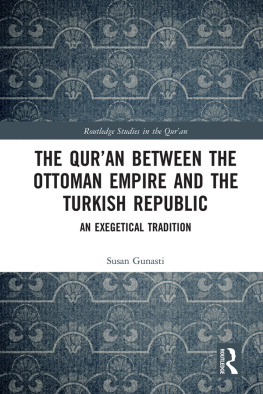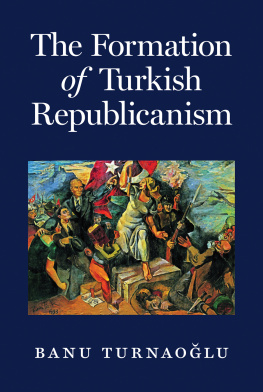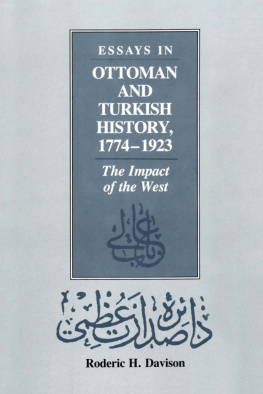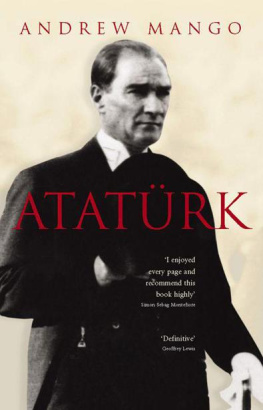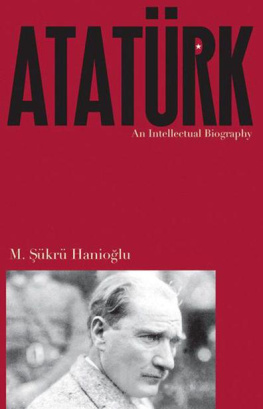Erik J. Zrcher is Professor of Turkish Studies at the University of Leiden and Director of the International Institute of Social History at Amsterdam. He is the author of numerous books on Turkey, including Turkey: A Modern History (I.B.Tauris), which has been translated into seven languages; Arming the State: Military Conscription in the Middle East and Central Asia, 1775 1925; Identity Politics in Central Asia and the Muslim World; and Men of Order: Authoritarian Modernization under Atatrk and Reza Shah (all I.B.Tauris).

In memory of Erik Zrcher
19282008
Published in 2010 by I.B.Tauris & Co Ltd
6 Salem Road, London W2 4BU
175 Fifth Avenue, New York NY 10010
www.ibtauris.com
Distributed in the United States and Canada Exclusively by Palgrave Macmillan 175 Fifth Avenue, New York NY 10010
2010 Erik J. Zrcher
The right of Erik J. Zrcher to be identified as the author of this work has been asserted by him in accordance with the Copyright, Designs and Patents Act 1988.
All rights reserved. Except for brief quotations in a review, this book, or any part thereof, may not be reproduced, stored in or introduced into a retrieval system, or transmitted, in any form or by any means, electronic, mechanial, photocopying, recording or otherwise, without the prior written permission of the publisher.
Library of Modern Middle East Studies: 87
ISBN: | 978 1 84885 271 6 (HB) |
978 1 84885 272 3 (PB) |
eISBN: | 978 0 85773 171 5 |
A full CIP record for this book is available from the British Library
A full CIP record is available from the Library of Congress
Library of Congress Catalog Card Number: available
Preface: Thirty Years of Turkish History
The year 1977 was a year of beginnings and ends. It was the year that Punk and New Wave music made their major breakthrough (with albums by The Clash, The Ramones and The Talking Heads among others) and in which Liverpool FC won its first of many European cups. It was the last year the Orient Express, by then a slow and rather dirty shadow of its former self, ran between Paris and Istanbul. It was also the year in which a 24-year-old student of Turkology (to use the quaint terminology of European oriental studies) at Leiden University, who incidentally had been on the Orient Express four times in the preceding years, took a stab at his first attempt at historical research on early twentieth-century Turkey. I was that student, and the product of my attempt was my MA thesis on the Izmir conspiracy of 1926 and the subsequent political trials.
Over the years many people have asked me, as undoubtedly they have asked every single one of my colleagues, what it was that first brought me to Turkish studies. As one does on such occasions, I have come up with many reasonable and plausible answers, but the only honest one would be: I really dont know. Having a father who for many years held the chair of East Asian history at Leiden, obviously rendered thinking about oriental studies an option. If one can make a living studying Chinese or Sanskrit, anything is possible. Around age 12 I became fascinated with the classic adventure books of the German author Karl May, not the better known ones about a hero implausibly called Old Shatterhand among the North American Indians, but the ones about the equally implausible protagonist called Kara Ben Nemsi, a German traveller in the Ottoman Middle East of the late nineteenth century. In spite of the rather strong anti-Turkish bias in these books (which romanticized noble savages like the Arab Bedouins and Albanian and Kurdish tribesmen) they produced in me a lasting fascination for the Ottoman Empire. I wrote term papers and did assignments on the Ottomans in high school. To find true faith of course one first has to be tempted and I was, playing seriously with the idea of studying Japanese before enrolling in the Middle East Studies programme of Leiden University. Once there, I opted for Arabic as my first language, but after a dismal first year, in which I failed nearly every exam, changed to Turkish. That choice had as much to do with the teachers as with the subjects taught. Having achieved my candidacy (the equivalent of the modern BA), I concentrated on Ottoman and Turkish history in my MA years, guided by an inspirational and erudite teacher, Dr Alexander de Groot. As for the last two years of my studies I was the only student in the class, it was just as well that I hit upon such a good teacher. The alternative does not bear thinking about. I myself must have been less inspiring, at least that is what I concluded when on one occasion I looked up from my reading of a seventeenth-century Ottoman chronicle to find my teacher sound asleep.
My MA thesis, though flawed in many respects, determined the direction my research in the next decades would take. It was based on a hunch, an idea that there was something very strange about the way the conspiracy and the trials of 1926 were depicted in Turkish and Western historiography. After all, in that historiography, the creation of modern Turkey was portrayed as the work of one man, Mustafa Kemal Atatrk, and a small circle of supporters. It was also depicted as having started in 1919 after the demise of the empire and disappearance of the Young Turks. Yet, in this historiography the 1926 purges were a way for the new, Kemalist, regime to deal with a threat from the outside, i.e. that of the former Unionists. But why was there a need, seven years after the end of the Unionist regime and three years after the establishment of the republic to purge the remaining leaders of the former regime as well as most of Mustafa Kemals co-leaders of the national independence movement after World War I if the Kemalists had already successfully supplanted them? My conclusion was that the trials were political purges and that Mustafa Kemal felt the need for these because his movement in 1919 had been started by the former Unionists and he had only gradually taken control of it. The movement and the republic that came out of it were built on a foundation formed by the former Committee of Union and Progress (CUP), and its former leaders could therefore conceivably challenge Mustafa Kemal as its leader. The other group to be purged, Mustafa Kemals co-leaders, were also former Unionists but had the added prestige of being national heroes of the independence war. They, too, could challenge his leadership and indeed had done so two years before, when they had started an opposition party, the Progressive Republican Party. In short, the independence movement and the republic were started and led by Unionists and built on the remnants of the CUP. Far from being a reckoning with Unionist outsiders by Kemalist insiders as the accepted historiography would have it, the 1926 trials were a way for one group of former Unionists (that around Kemal) to ward off the challenges from within of other former Unionists who could contest Kemals leadership because, like him, they had a credible claim on the loyalty of the political lite.
After completing the MA degree, and facing a second temptation (this time to enter the diplomatic service, which had always taken its share of Leiden orientalists), I started teaching in Nijmegen University and over the next 15 years produced two books that were the logical extension of the MA thesis. One of them was my Ph.D. thesis, defended in Leiden in 1984 and published as The Unionist Factor. The Role of the Committee of Union and Progress in the Turkish National Movement (19051926). This study emphasized the continuity between the Young Turk period in late Ottoman history and the early republic. It investigated Mustafa Kemals place within the Committee and the Committees role in the independence movement led by Kemal. My conclusion was far-reaching and ran counter to everything that was and is sacred in the official historiography of the Turkish republic. I attempted to show that the national resistance movement after World War I was not only built on the remnants of the CUP, but that the CUP leadership actually planned and organized the resistance and launched Mustafa Kemal as its leader. I described his struggle to become the unchallenged leader of the movement and explained the 1926 crackdown from the sense of vulnerability this left him with. The second book came out in 1991. It was entitled
Next page
